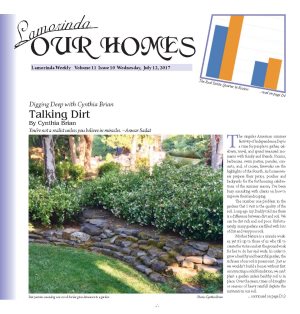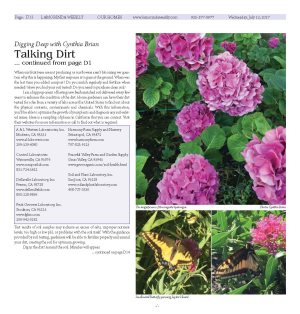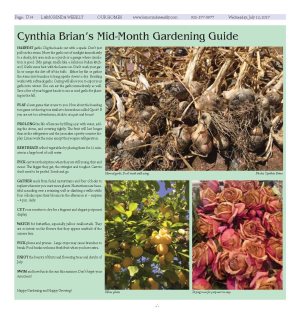|
|
Published July 12th, 2017
|
Digging Deep with Cynthia Brian
|
| Talking Dirt |
| By Cynthia Brian |
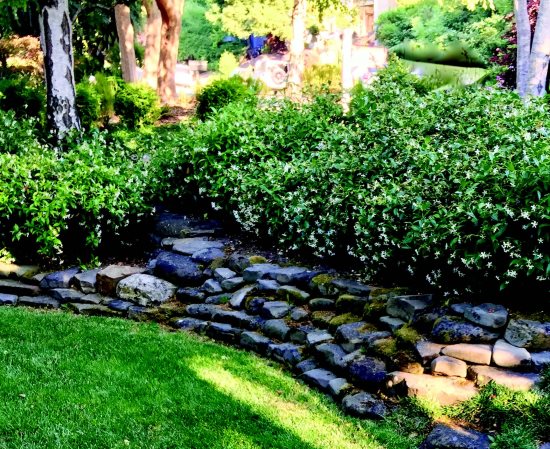 |
| Star jasmine cascading over a rock border gives dimension to a garden. Photos Cynthia Brian |
The singular American summer festivity of Independence Day is a time for people to gather, celebrate, travel, and spend treasured moments with family and friends. Picnics, barbecues, swim parties, parades, concerts, and, of course, fireworks are the highlights of the Fourth. As homeowners prepare their patios, porches and backyards for the forthcoming celebrations of the summer season, I've been busy consulting with clients on how to improve their landscaping.
 The number one problem in the gardens that I visit is the quality of the soil. Long ago my Daddy told me there is a difference between dirt and soil. We can be dirt rich and soil poor. Unfortunately, many gardens are filled with lots of dirt and very poor soil.
The number one problem in the gardens that I visit is the quality of the soil. Long ago my Daddy told me there is a difference between dirt and soil. We can be dirt rich and soil poor. Unfortunately, many gardens are filled with lots of dirt and very poor soil.
 Mother Nature is a miracle worker, yet it's up to those of us who till to create the vision and set the groundwork for her to do her real work. In order to grow a healthy and beautiful garden, the richness of our soil is paramount. Just as we wouldn't build a house without first constructing a solid foundation, we can't plant a garden unless healthy soil is in place. Over the years, times of droughts or seasons of heavy rainfall deplete the nutrients in our soil.
Mother Nature is a miracle worker, yet it's up to those of us who till to create the vision and set the groundwork for her to do her real work. In order to grow a healthy and beautiful garden, the richness of our soil is paramount. Just as we wouldn't build a house without first constructing a solid foundation, we can't plant a garden unless healthy soil is in place. Over the years, times of droughts or seasons of heavy rainfall deplete the nutrients in our soil.
 When our fruit trees are not producing or our flowers aren't blooming we question why this is happening. My first response is to gaze at the ground. When was the last time you added compost? Do you mulch regularly and fertilize when needed? Have you had your soil tested? Do you need to purchase clean soil?
When our fruit trees are not producing or our flowers aren't blooming we question why this is happening. My first response is to gaze at the ground. When was the last time you added compost? Do you mulch regularly and fertilize when needed? Have you had your soil tested? Do you need to purchase clean soil?
 I am a big proponent of having new fresh enriched soil delivered every few years to enhance the condition of the dirt. Home gardeners can have their dirt tested for a fee from a variety of labs across the United States to find out about the physical contents, contaminants and chemicals. With this information, you'll be able to optimize the growth of your plants and diagnosis any soil-related issues. Here is a sampling of places in California that you can contact. Visit their websites for more information or call to find out what is required.
I am a big proponent of having new fresh enriched soil delivered every few years to enhance the condition of the dirt. Home gardeners can have their dirt tested for a fee from a variety of labs across the United States to find out about the physical contents, contaminants and chemicals. With this information, you'll be able to optimize the growth of your plants and diagnosis any soil-related issues. Here is a sampling of places in California that you can contact. Visit their websites for more information or call to find out what is required.
 Test results of soil samples may indicate an excess of salts, improper nutrient levels, too high or low pH, or problems with the soil itself. With the guidance provided by soil testing, gardeners will be able to fertilize properly and amend your dirt, creating the soil for optimum growing.
Test results of soil samples may indicate an excess of salts, improper nutrient levels, too high or low pH, or problems with the soil itself. With the guidance provided by soil testing, gardeners will be able to fertilize properly and amend your dirt, creating the soil for optimum growing.
 Dig in the dirt! Amend the soil. Miracles will appear.
Dig in the dirt! Amend the soil. Miracles will appear.
 Cynthia Brian's Mid-Month Gardening Guide
Cynthia Brian's Mid-Month Gardening Guide
 HARVEST garlic. Dig the heads out with a spade. Don't just pull on the stems. Move the garlic out of sunlight immediately to a shady, dry area such as a porch or a garage where circulation is good. (My garage smells like a delicious Italian kitchen!) Garlic cures best with the leaves on. Don't wash your garlic or scrape the dirt off of the bulb. Either lay flat or gather the stems into bunches to hang upside down to dry. Braiding works with softneck garlic. Curing will allow you to enjoy your garlic into winter. You can eat the garlic immediately as well. Save a few of your biggest heads to use as seed garlic for planting in the fall.
HARVEST garlic. Dig the heads out with a spade. Don't just pull on the stems. Move the garlic out of sunlight immediately to a shady, dry area such as a porch or a garage where circulation is good. (My garage smells like a delicious Italian kitchen!) Garlic cures best with the leaves on. Don't wash your garlic or scrape the dirt off of the bulb. Either lay flat or gather the stems into bunches to hang upside down to dry. Braiding works with softneck garlic. Curing will allow you to enjoy your garlic into winter. You can eat the garlic immediately as well. Save a few of your biggest heads to use as seed garlic for planting in the fall.

 PLAY a lawn game that is new to you. How about the beanbag toss game or the ring toss similar to horseshoes called Quoit? If you are not too adventurous, stick to croquet and bocce!
PLAY a lawn game that is new to you. How about the beanbag toss game or the ring toss similar to horseshoes called Quoit? If you are not too adventurous, stick to croquet and bocce!

 PROLONG the life of lemons by filling a jar with water, adding the citrus, and covering tightly. The fruit will last longer than in the refrigerator and the jar makes a pretty counter display. Limes work the same except they require refrigeration.
PROLONG the life of lemons by filling a jar with water, adding the citrus, and covering tightly. The fruit will last longer than in the refrigerator and the jar makes a pretty counter display. Limes work the same except they require refrigeration.

 REHYDRATE wilted vegetables by placing them for 15 minutes in a large bowl of cold water.
REHYDRATE wilted vegetables by placing them for 15 minutes in a large bowl of cold water.

 PICK carrots at their prime when they are still young, thin and sweet. The bigger they get, the stringier and tougher. Carrots don't need to be peeled. Scrub and go.
PICK carrots at their prime when they are still young, thin and sweet. The bigger they get, the stringier and tougher. Carrots don't need to be peeled. Scrub and go.

 GATHER seeds from faded nasturtiums and four o'clocks to replant wherever you want more plants. Nasturtiums are beautiful cascading over a retaining wall or climbing a trellis while four o'clocks open their blooms in the afternoon at - surprise - 4 p.m. daily.
GATHER seeds from faded nasturtiums and four o'clocks to replant wherever you want more plants. Nasturtiums are beautiful cascading over a retaining wall or climbing a trellis while four o'clocks open their blooms in the afternoon at - surprise - 4 p.m. daily.

 CUT rose rosettes to dry for a fragrant and elegant potpourri display.
CUT rose rosettes to dry for a fragrant and elegant potpourri display.

 WATCH for butterflies, especially yellow swallowtails. They are so intent on the flowers that they appear unafraid of the camera lens.
WATCH for butterflies, especially yellow swallowtails. They are so intent on the flowers that they appear unafraid of the camera lens.

 PICK plums and prunes. Large crops may cause branches to break. Food banks welcome fresh fruit when you have extra.
PICK plums and prunes. Large crops may cause branches to break. Food banks welcome fresh fruit when you have extra.

 ENJOY the bounty of fruits and flowering trees and shrubs of July.
ENJOY the bounty of fruits and flowering trees and shrubs of July.

 SWIM and have fun in the sun this summer. Don't forget your sunscreen!
SWIM and have fun in the sun this summer. Don't forget your sunscreen!


 Happy Gardening and Happy Growing!
Happy Gardening and Happy Growing!


|
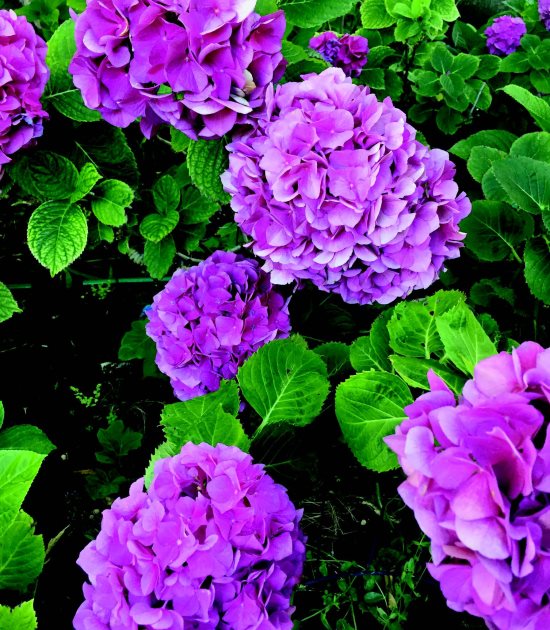 |
| The magnificence of the magenta hydrangea. Photos Cynthia Brian |
 |
| Swallowtail Butterfly pursuing Jupiter's Beard |
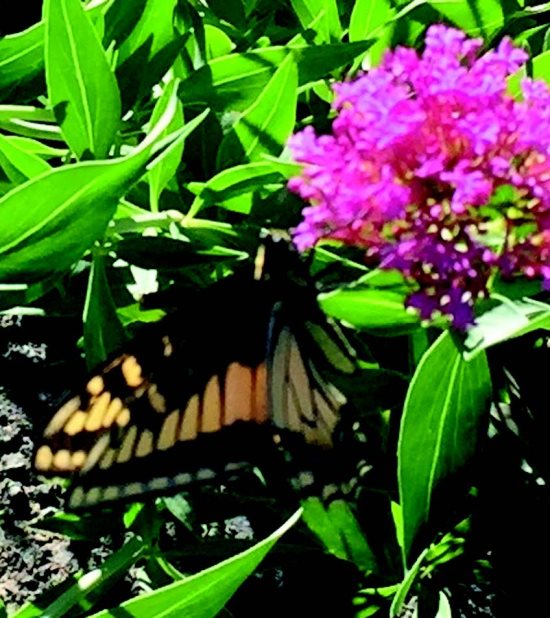 |
| Swallowtail Butterfly pursuing Jupiter's Beard |
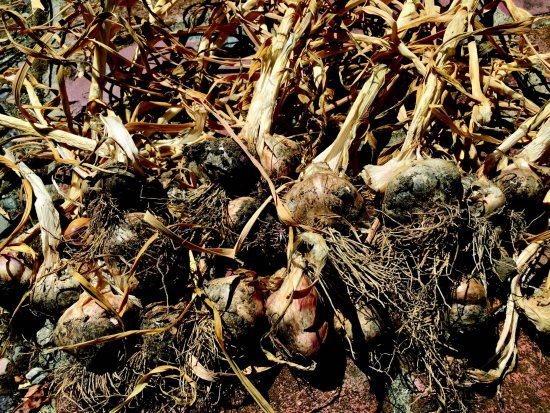 |
| Harvest garlic. Don't wash until using. Photos Cynthia Brian |
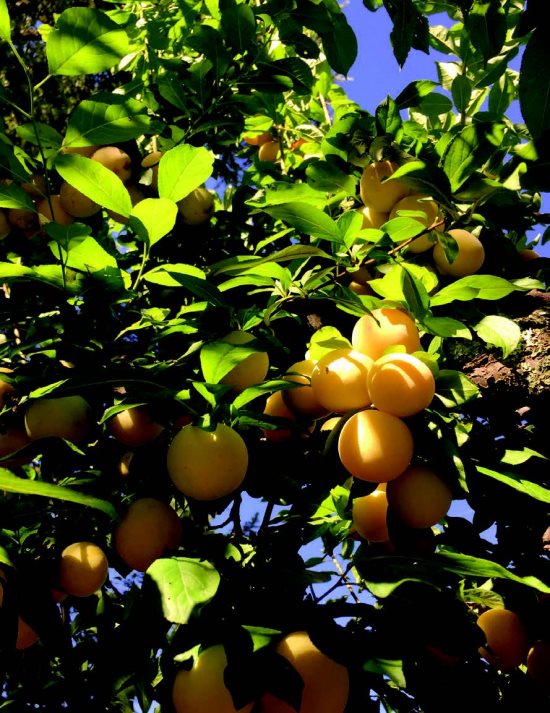 |
| Yellow plums |
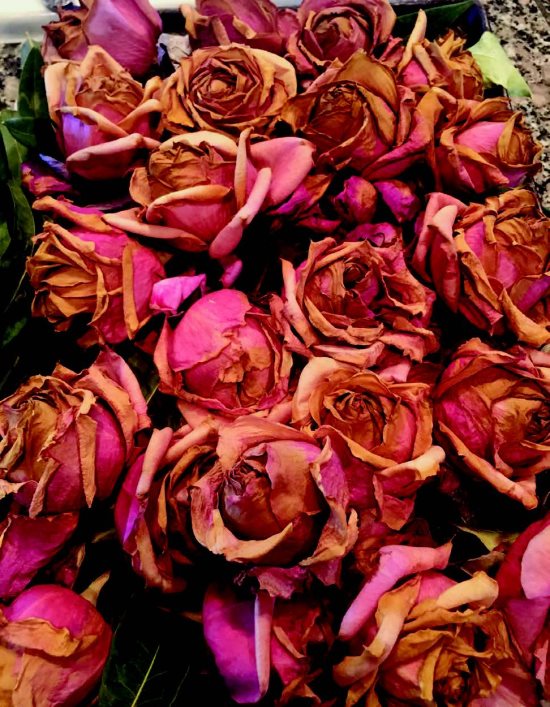 |
| Drying roses for potpourri is easy. |
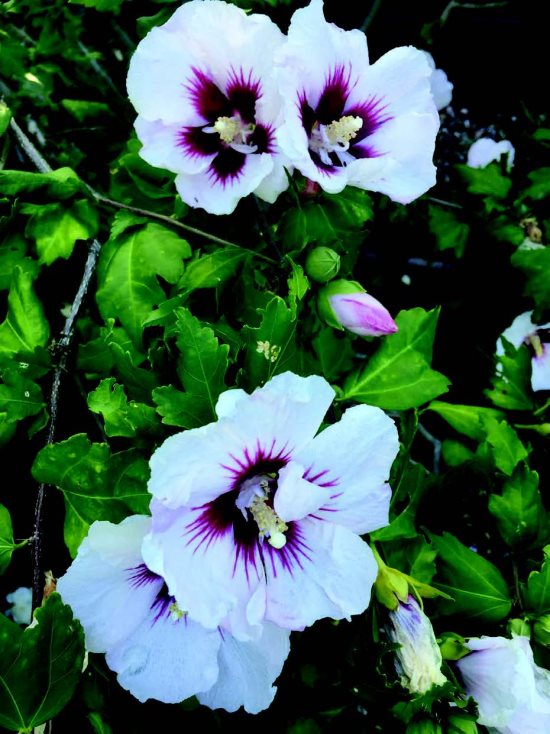 |
| Rose of Sharon Hibiscus is a beautiful addition to any garden |
 |
| Cynthia Brian with her favorite fragrant lily-Lillium Speciosum |
| Cynthia Brian, The Goddess Gardener, is a New York Times best
selling author, actor, radio personality, speaker, media and writing
coach as well as the Founder and Executive Director of Be the Star You
Are1(r) 501 c3. Tune into Cynthia's Radio show at
www.StarStyleRadio.com Her
new book, Growing with the Goddess Gardener will be available soon!
Hire Cynthia for your next project,
Cynthia@GoddessGardener.com
www.GoddessGardener.com
925-377-STAR |
| |
| |
| |
| |
|
|
|











